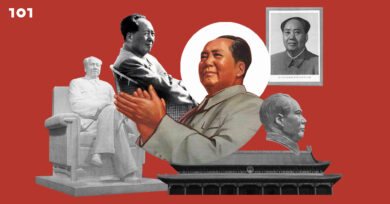Peter Ungphakorn Story
Papimol Lotrakul Illustration
[box]
Brexit has almost completely dominated British politics. A strange calm briefly interrupted months of hectic activity, but not for long. Peter Ungphakorn considers five lessons learnt so far. Part 4: is the Prime Minister the problem?
[/box]

For months, the United Kingdom’s chaotic efforts to set up its departure from the European Union (Brexit) saw almost daily twists and turns. Tension mounted and the British moved ever closer to crashing over the cliff-edge and out of the EU, with only the flimsiest of parachutes.
This is the fourth of five parts on thoughts on what happened in the last couple of years and on what lies ahead. Several have been discussed before. They all contain new developments:
- after all the frantic to-ing and fro-ing, almost nothing has changed for Britain
- nearly three years of political debate has failed to produce better-informed arguments
- if those past three years were bad, what lies ahead is going to be worse
- Theresa May’s handling has been disastrous but she might still get what she wants — just
- simplistic definitions of democracy and sovereignty are unhelpful
4. Theresa May’s handling worsened divisions
Theresa May has promised to leave office once the UK has left the EU. That’s when the second phase of negotiations with the EU are due to start. She is increasingly blamed for the mess.
Among the many criticisms, four recur.
One is her preference to go it alone. Brexit is a huge national issue, but May barely consulted anyone, even the ministers she appointed to handle Brexit, but also the rest of her Cabinet, other political parties (until April 2019), businesses, trade unions and non-governmental organisations, and the other countries of the UK, particularly Scotland and Wales.
“The Prime Minister marginalised those she thought were giving inconvenient advice,” summed up the independent Institute for Government.
One of the risks is the break-up of the United Kingdom itself.
“The Prime Minister made bold promises to the Scottish First Minister [Nicola Sturgeon] on her first visit to Edinburgh in July 2016, which her Government then notably failed to follow through,” the Institute says.
A majority in Scotland, in particular, voted to remain in the EU. Because of May’s hard “red lines” in her talks with the EU, momentum seems to be building in Scotland for another referendum to leave the UK, and to stay in or rejoin the EU.
Related to that is her narrow focus on holding together warring factions of the Conservative Party, rather than reaching out and listening to the country as a whole. She only started talking seriously to the opposition Labour Party shortly before Easter 2019. Even this was about finding the numbers to support the Withdrawal Agreement rather than real consensus-building.
Another is May’s long-standing obsession with curbing immigration and therefore her rejection of the EU Single Market’s freedom of movement of people, in any form — one of her unbreachable “red lines”. This has limited her options in talks with the EU.
Some but by no means all Brexiters agree with her that this was a reason why many voted to leave in the 2016 referendum. The downside is that already a wide range of employers, from the National Health Service to fruit farmers, report shortage of labour of all skill levels.
Worse, the atmosphere has soured. It has encouraged more open xenophobia and racism. A number of EU citizens say they no longer feel welcome in a country many had made their home for decades.
The fourth is her failure to acknowledge the trade-offs and complexity of Brexit. Admittedly this is a concern mainly among those who study it closely.
May preferred simple slogans: “Brexit means Brexit” (which means nothing), or “a Brexit that works for all” (impossible, since there will be winners and losers).
Politicians don’t like to admit that their policies have downsides. But May’s failure to discuss this at all meant the trade-offs were kept out of a poorly-informed and deteriorating the public debate.
In a politely worded in-depth assessment released on April 16, the Institute for Government describes a catalogue of failings under May. Drawing lessons from the first phase to assess the second, it rarely refers to the prime minister directly, but it’s clear her management style has been a problem. This is one of the more direct references:
“One of the Prime Minister’s first acts on taking office was to establish a new Department for International Trade — taken as an immediate signal by the EU that the UK intended to leave the customs union. After a period of silence, the Prime Minister first started to flesh out her vision of Brexit, not in a green or white paper that would have been subject to collective agreement, but in her speech to the Conservative Party conference; thereby circumventing normal decision-making processes and relying on No.10 [the Prime Minister’s Office] advisers. The full implications of the Prime Minister’s red lines, for businesses and for the Irish border, only emerged after she had set them out.”
And yet she might just get her wish to see Brexit’s delivery as her legacy. This would have to happen before the end of June. She would have to reach agreement first with the Labour Party and then the EU. Labour would have to drop its call for a referendum on whatever is agreed. The chances are miniscule.
__________________________
Previously: They ain’t seen nothing yet
Next: Democracy and sovereignty weaponised
__________________________
Find out more
- Article 50 two years on (The UK in a Changing Europe, 2019)
- Negotiating Brexit: Preparing for talks on the UK’s future relationship with the EU (Institute for Government, 2019)
- Brexit: A Love Story? (Audio — a highly recommended series of BBC Radio Four podcasts, 2018–19)
__________________________
Previous articles on Brexit
- And I leave you with Brexit (again), as it heads into ever darker hours (December 21, 2018)
- Five days of mathematical impossibility in the parallel universe of Brexit (October 19, 2018)
- When complexity challenges public opinion and democracy. Part 3—Brexit, two years later (June 22, 2018)
- Can a UK-EU Brexit deal really emerge from this chaos? (June 27, 2017)
See also the author’s blog
Peter Ungphakorn is based on the shores of Lake Léman in Switzerland. He spent almost two decades with the WTO Secretariat, Geneva. Before that he worked for The Nation and the Bangkok Post. He now writes for IEG Policy on agricultural trade issues and blogs on trade, Brexit and other issues at https://tradebetablog.wordpress.com/. He tweets @CoppetainPU.



